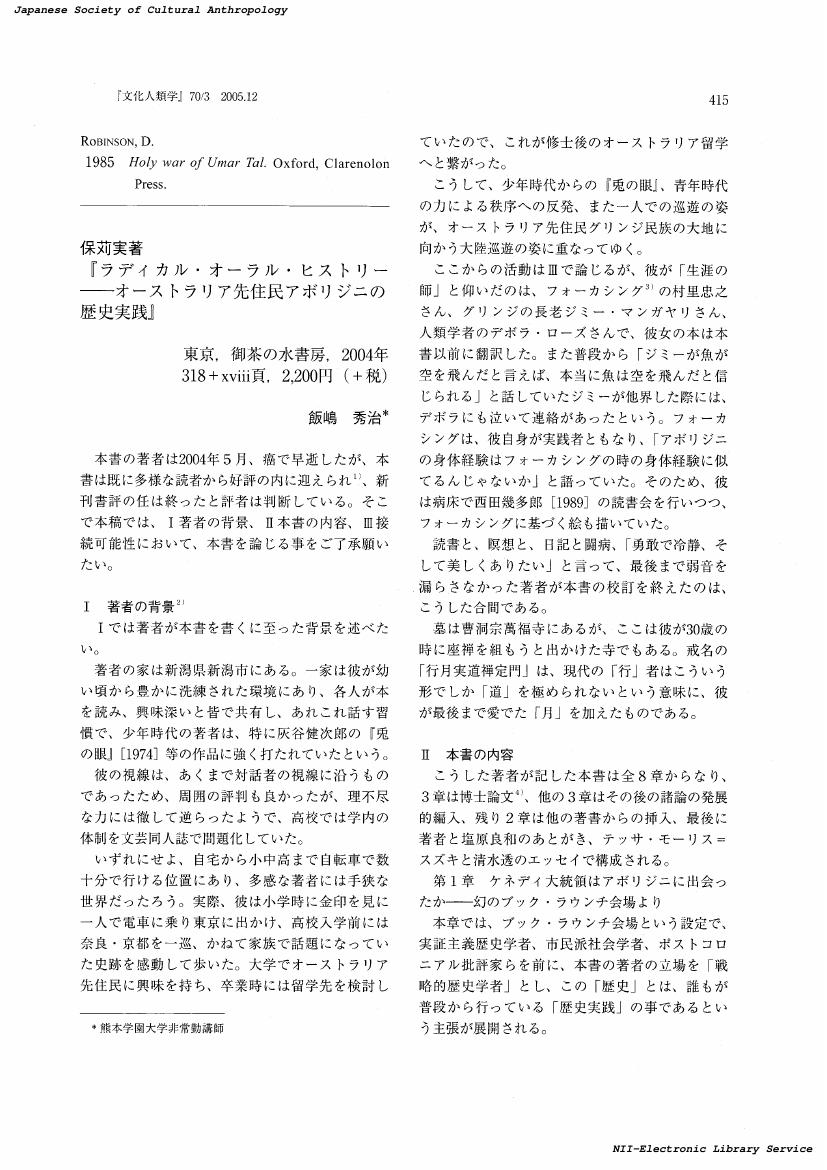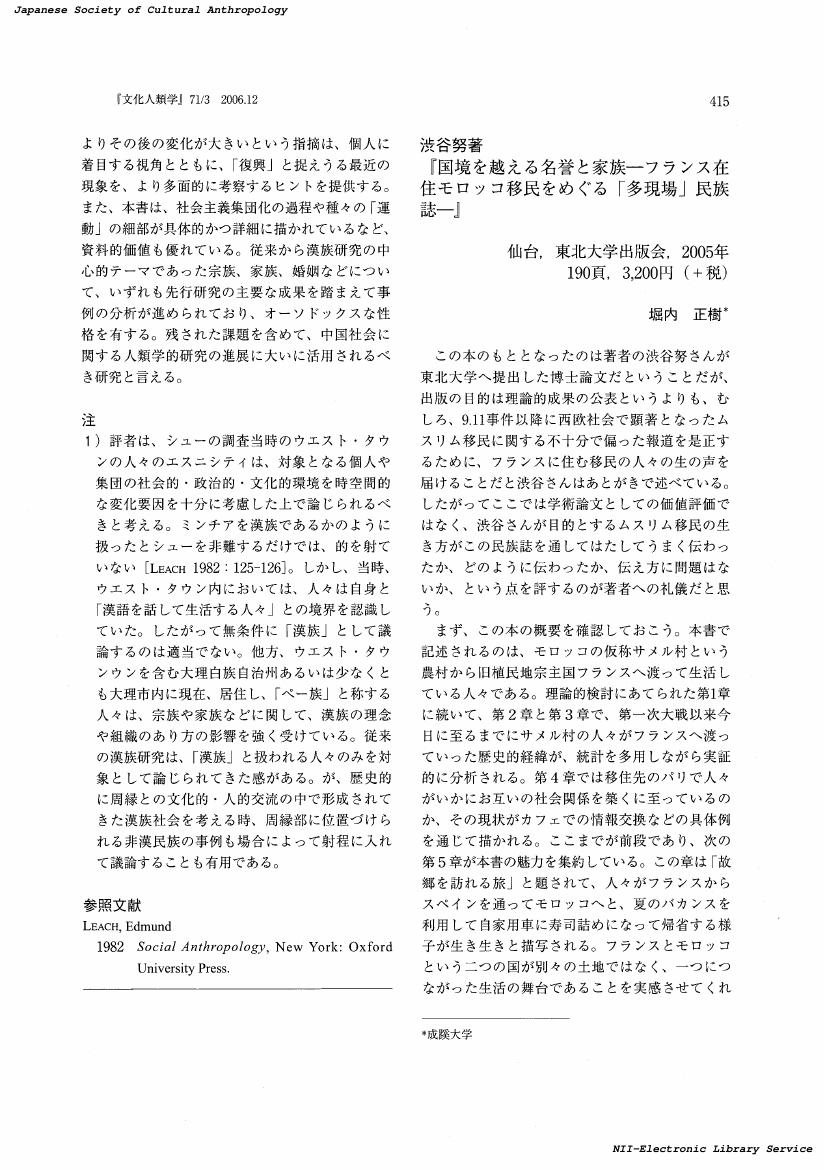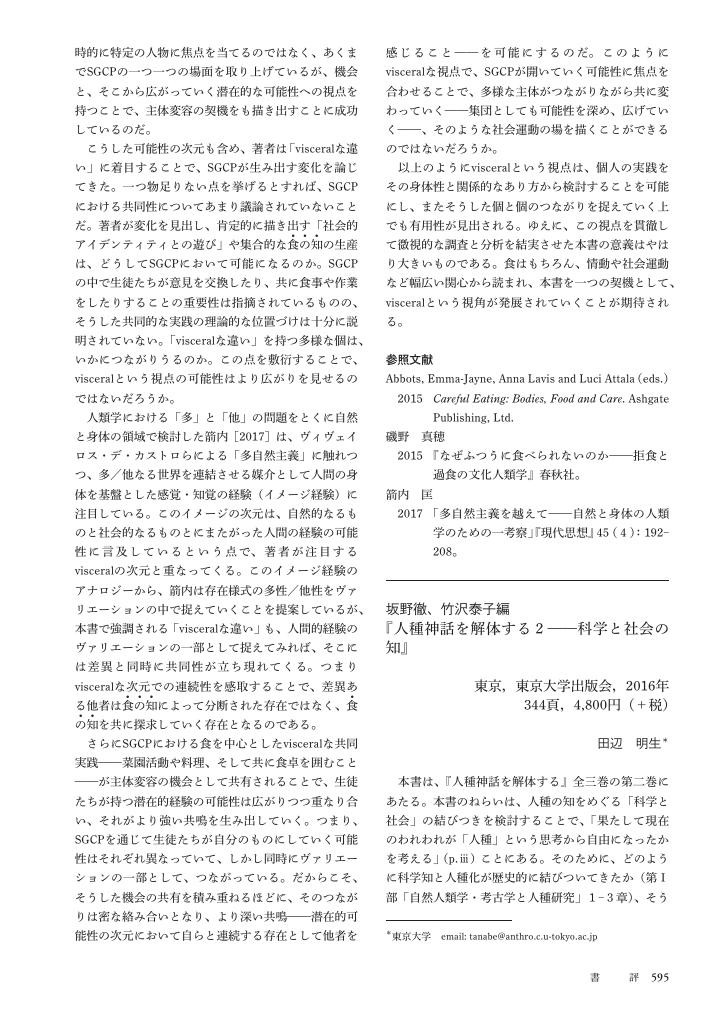1 0 0 0 OA トルコにおけるアレヴィーの人々の社会変化 : 宗教的権威と社会範疇に関する人類学的考察
- 著者
- 若松 大樹
- 出版者
- 日本文化人類学会
- 雑誌
- 文化人類学 (ISSN:13490648)
- 巻号頁・発行日
- vol.76, no.2, pp.146-170, 2011-09-30 (Released:2017-04-17)
本稿では、トルコ共和国のアレヴィーと呼ばれる集団の社会変化に関する一考察として、これまでの先行研究においてアレヴィー社会の「スンニー化」と呼ばれてきた現象に関して、批判的検討を行う。本稿では、西部アナトリア・キュタフヤ県のアレヴィー村落におけるデデ権威と、それに関連するオジャクと呼ばれる帰属概念を事例として取り上げる。オスマン朝時代、スンナ派イスラームが国教とされ、この教義とは異なるイスラーム的伝統を持つアレヴィーの人々は、中央政府から「異端派」としてレッテルをはられるだけでなく、ムスリムとすらみなされず、宗教実践や教義を理由にしばしば迫害を受けてきた。ところが、世俗主義と政教分離を国是として1923年に成立したトルコ共和国においては、人々はいかなる宗教によっても差別されないとの憲法上の規定があるため、アレヴィーの人々はトルコ共和国の国是を肯定し、多数派であるスンナ派の人々からの差別をある程度免れてきた。しかしながら、1990年代以降、スンナ派中心のイスラーム主義運動の高揚に伴い、この国是が揺らぎ始め、さらに農村部から都市部への移民の増加によって、アレヴィーとスンナ派の人々の直接的な接点が増え始めた状況において、アレヴィーの人々は再びスンナ派の人々から侮蔑的な偏見を被ることとなり、アレヴィーの人々の多くは、自分たちのアイデンティティをムスリムとして再定義し、多数派であるスンナ派の人々に対して、アレヴィー・ムスリムとしてのアイデンティティを主張する必要に迫られてきた。このような主張の中には、アレヴィーの人々がトルコ的イスラームの真髄を体現するものであり、スンナ派よりもむしろイスラームの本来の教えを実践しているという主張さえある。こうした現象は、これまでの先行研究においてアレヴィー集団の「スンニー化」としてとらえられてきた。しかしながらこうした見方は、アレヴィーの人々の主張を正確に反映しているとは言い切れない。本稿では、第1にアレヴィーの「スンニー化」をめぐる先行研究が、儀礼実践の変化という側面にのみ注目してスンニー化と述べていることを明らかにする(第II章)。第2に、西部アナトリア・キュタフヤ県のアレヴィー集落を事例として取り上げ、そこでの聞き取り調査や儀礼観察の結果、彼/彼女らが自らをアレヴィーとして自己規定する根拠として、オジャクという帰属概念が重要な役割を果たしていることを明らかにする(第III章)。第3に、デデと呼ばれる宗教権威や人々が「固有のアレヴィー性」を主張する際に影響を与えているのが、スンナ派系のイスラーム主義運動やアレヴィー系知識人の作り出した言説にあることを示し(第IV章)、これまで研究者の側が無意識であれ、そうした言説に左右されている可能性があることを指摘して、これまでの先行研究において「スンニー化」として記述されてきた現象が、実は儀礼実践の変化など、可視的な変化のみに着目して安易に論じていることを解明する。したがってこうした分析軸は、フィールドに暮らす人々の自己規定を必ずしも反映するものではなく、「スンニー化」の語を、とりわけ本稿で扱うアレヴィー社会の社会変化に適応することは不適切である。人類学者が社会変化を扱う場合は、社会変化の可視的な部分だけでなく、人々の自己規定など、複数の要素から深く検討して記述する必要があることを、本稿で提起する。
1 0 0 0 OA 世界生成のシステムのエンジン イヌイトと近代の存在論の比較からみる存在論の機能
- 著者
- 大村 敬一
- 出版者
- 日本文化人類学会
- 雑誌
- 文化人類学 (ISSN:13490648)
- 巻号頁・発行日
- vol.86, no.1, pp.057-075, 2021-06-30 (Released:2021-09-23)
- 参考文献数
- 39
本稿の目的は、先住民の存在論の1つ、カナダ極北圏の先住狩猟採集民のイヌイトの存在論を近代の存在論と比較することで、多種多様な生命体がダイナミックにもつれ合う現実の宇宙という地平で多様な先住民の存在論と近代の存在論を対称的に理解することがどのような可能性を拓くのかを考えることである。そのために、本稿ではまず、イヌイトが実際の宇宙で実践している生業活動の現実にイヌイトの存在論と近代の存在論を位置づけて検討する。そして、そのどちらか一方が現実を正しく映し出し、他方が単なる空想の産物であるというわけではなく、どちらの存在論も、その真偽を直接に確認することはできないが、生業活動でイヌイトが実感している経験を妥当に説明しうるものであるという点で等価であることを確認する。そのうえで、そうであるにもかかわらず、イヌイトが近代の存在論ではなく、イヌイトの存在論を採択しているのは何故なのかを考えながら、この2つの存在論をイヌイトの生業システムに位置づけて比較し、これらの共通点と差異を析出する。最後に、この分析に基づいて、多様な先住民の存在論と近代の存在論を等しく位置づけ、多種多様な生命体がもつれ合う現実の宇宙のなかで存在論がどのようなメカニズムで機能しているかを探る局所的な関係論的生成論の視点が、人類学の未来にどのような展望を拓くのかについて考察する。
- 著者
- 岸上 伸啓
- 出版者
- 日本文化人類学会
- 雑誌
- 文化人類学 (ISSN:13490648)
- 巻号頁・発行日
- vol.70, no.4, pp.505-527, 2006-03-31 (Released:2017-09-25)
本稿では、カナダ国モントリオールの都市イヌイットをめぐる私自身の人類学的な調査を検討することによって、人類学的実践の限界と可能性を論じる。本稿で概略したように、私は1996年からモントリオールの都市イヌイットの中で人類学的な調査を実施してきた。そして1997年調査の結果は、モントリオール在住の何人かのイヌイットがモントリオール・イヌイット協会や月例夕食会を開始する契機となった。人類学者として私は都市イヌイットの民族誌を作成しようとした。また、同時にモントリオール・イヌイット協会のボランティアの協力者として協会に関係する問題に関して都市イヌイットの間や、彼らとカナダ政府の役人との間で仲介者の役割を果たしてきた。さらに、協会の代表者たちやカナダ政府の役人たちは、彼ら自身の目的のために私のデータや調査結果を利用している。前者の人たちは、カナダ政府からよりよい経済的な援助を受けようとして私の調査データを利用している。後者の人たちはオタワで政策を立案するために都市イヌイットの現状をよりよく理解するためにデータを利用している。このような状況の中で、私は人類学的実践や人類学者の役割を再考せざるを得なかった。とくに私は私自身の調査が多くの人々の生活に影響を及ぼすことを知ったので、人類学的な調査を行なう時には、倫理的な問題とかかわらざるを得ない。私は、文化人類学の目的とは現地調査において当事者と外部の両方の視点から、ほかの諸民族や諸社会とのかかわりの中で所与の人々が産み出す実践や言説、社会・文化現象を理解し、記述することであると考えている。この論文で示したように、人類学者は、主流社会に属する人々が無視する傾向があった人々の生活や文化を描き出すことができる。これは人類学の学術的な意義のひとつである。さらに、そのような調査の結果は、不遇な境遇にある人々の生活を改善させるための社会運動や政策形成に応用することができるので、人類学者は実践的なやり方で人類の諸問題の解決に大いに貢献することができる。概して現代の人類学は、目的に応じて民族誌の作成と応用人類学に大きく分けられる傾向にあるが、実際には両者の実践は相互に関係している。すなわち、長期の現地調査に基づいた研究は、現代の世界における数多くの多様な問題の解決に応用することができる。近年、「行動人類学」や「公共人類学」が人類学者の間で注目されてきた。本論文で私自身のモントリオール調査の事例で紹介したように、人々の生活に影響を及ぼす人類学的な実践の正当性の問題や集団内に派閥を作り出したような多くの倫理的な問題が付きまとう。これらの問題を避けることは不可能であるが、すべての人類学的実践を人類学者自身が自省しつつ行なうこと、そしてその人類学者以外の人がその実践を評価・批判し、常に相対化することによって、状況は改善されるであろうと私は主張する。最後に、民族誌的な表象における「文化を書く」ショックの問題を取り上げたい。ほかの諸民族や諸文化を研究し、記述する時に、新しい民族誌の描き方を開発するだけでは文化を記述する諸問題を解決することはできない。なぜならば、その間題は部分的には調査者とかれらのインフォーマントとの間にある世界システムが生み出す政治経済的な権力関係の不平等性に基づいているからである。しかしながらこの間題を部分的にせよ解決するもしくは改善させるためには、私は、個々の書き手(人類学者)、共著者(人類学者とインフォーマント)、インフォーマントおよび彼らと同じ集団のほかの成員、そのほかの読者(民族誌の消費者)が参加し、表象を検討しあうフォーラムの場をつくり、評価・批判しあう方が、新たな人類学的な知識、さらには新たな民族誌表象を生み出す可能性があるという点ではるかに実り多いと主張したい。民族誌に関するこの種のフォーラムでは、個々の民族誌の文化表象や集団表象の諸問題を完全には解決することはできないが、新しい人類学的な知識を生み出す刺激を提供することができる。
- 著者
- 関根 久雄
- 出版者
- 日本文化人類学会
- 雑誌
- 文化人類学 (ISSN:13490648)
- 巻号頁・発行日
- vol.72, no.3, pp.361-382, 2007-12-31 (Released:2017-08-21)
- 被引用文献数
- 10
本稿は、NGO関係者など開発援助の実務に携わる人々と人類学者との相互関係のあり方を「対話」と「協働」の視点から捉え、フィールドにおける人類学者の応用的実践スタイルを提示することを目的とする。1980年代以降の開発援助は、地域住民や女性などの社会的弱者をエンパワーすることに目配りする社会開発が強調されるようになった。とりわけ「住民参加」の理念が重視され、PRAはその代表的な調査法として知られる。参加型開発において、現地の文化的側面に対する配慮は、理念的に自明である。しかしそこで必要とされる「現地の文化」に関する知識や洞察は、適度な情報量とその提示方法によってもたらされるものであり、決して人類学者の書く「厚い」民族誌でもレトリカルな表現を駆使した論考というわけではない。開発援助の実務者たちは、人類学者による社会や文化に関わる情報や助言よりも、支援活動に直接関係する実用的な技術や専門知識を求める。むしろ彼らは、人類学者に対しては、そのような専門家に対する技術的期待とは異なり、現地の社会や人々について語り合う「対話者」(あるいはディスカッサント)としての役割を期待する。本稿では、人類学者がフィールドワークを通して開発援助の文脈に関わることについて、地域住民の視点に寄り添い、社会文化的視点からの解釈を交えながらそのプロセスに参与することを前提に、状況に応じて多様な形態・形式のもとで生み出される人類学者と「現地の人々」との対話やそれに基づく媒介者的・エイジェント的実働(「つなぐ」行為)との連続性を重視する創発的協働を、基本的な実践スタイルとして提示する。そしてさらに、その協働を実体化させるために、従来人類学者から疎遠であった開発援助業界で「常識化」している事柄にも親和性を維持し開発援助の文脈における発話機会を戦略的に確保する必要について指摘することを通じて、開発援助に関わる人々(「現地の人々」を含む)と人類学者との「意味のある」協働の可能性について考察する。
1 0 0 0 序
- 著者
- 相田 豊
- 出版者
- 日本文化人類学会
- 雑誌
- 文化人類学 (ISSN:13490648)
- 巻号頁・発行日
- vol.87, no.3, pp.407-420, 2022-12-31 (Released:2023-04-21)
- 参考文献数
- 109
Taking its cue from the articles in this special issue, this introduction explores what value the debates over the "post-relation" might have for Japanese anthropology and its studies on music. It argues that in these two decades after 2000, Japanese anthropology has valued and quite frequently overvalued the social power the relation may have, influenced by the precarious social situation of Japanese society, which has experienced a drastic post-industrialization shift. Especially focused on the studies on music, which has had a significantly active role in those relation-focused debates, it demonstrates how mainstream Japanese anthropological debates have been dependent on and reproduced its relational thinking. Hence, it maintains the necessity of the revaluation of solitude or being alone as an ethnographic concept, overlooked and even ignored although sometimes found in people's actual lives. This introduction is not intended to provide any theoretical definition for "solitude." Instead, it reviews the three original strategies and techniques—the institutionalization of the relation, self-enjoyment, and in-relation analysis—that the articles of the special issue used to expose their ethnographic details.
1 0 0 0 OA 偶然性に没頭し賭けることの有意味性 フィリピンにおける数字くじの事例から
- 著者
- 師田 史子
- 出版者
- 日本文化人類学会
- 雑誌
- 文化人類学 (ISSN:13490648)
- 巻号頁・発行日
- vol.86, no.3, pp.365-383, 2021-12-31 (Released:2022-04-14)
- 参考文献数
- 31
本稿では、フィリピンの数字くじを事例に、賭けの実践と結果の解釈についての検討を通じて、賭けに繰り返し没頭する人びとによって遊戯の世界がいかに想像·構築されているのかを考察する。遊び理論の中で、単調で純粋な偶然性の遊びである数字くじは遊戯者の自律的関与が及ばない「つまらない」遊びに分類されるが、事例においては「面白い」遊戯として遊び変えられている。愛好家たちは、抽せん数字を予想するために日常世界のあらゆる存在や出来事から数字のサインを読み取る。また、賭けの結果は賭けた自己をとりまいていた過去を遡及的に参照することで理解される。こうした数字への賭けの反復は、無根拠な数字くじの遊戯の世界に恣意的な意味づけをし、賭ける自己と数字の間に関係性を想像しながら、偶然的事象を幸運の物語として認識する行為である。経験や知識は秩序づけられて未来の賭けに運用されるものの、数字くじの偶然性は絶対的に残存し続ける。この点において数字への賭けは、いまここにおいて幸運であるか否かという自己の現在的状況を確認する契機として機能する。幸運と戯れ、幸運を狩りたてることに、遊戯としての数字くじの面白さは醸成されている。
- 著者
- 加藤 恵津子
- 出版者
- 日本文化人類学会
- 雑誌
- 文化人類学 (ISSN:13490648)
- 巻号頁・発行日
- vol.71, no.2, pp.202-220, 2006-09-30 (Released:2017-08-28)
本稿では、ポストコロニアル研究隆盛のさなかで「日本人によるネイティヴ人類学」は何をするべきか、またその仕事にはどのような困難が伴うかを論じる。「日本人によるネイティヴ人類学」とは、日本人の人類学徒による自文化研究すべてを指すものではない。それは「ネイティヴ」という語の前提にある欧米中心的ヘゲモニーを、意識し批判することを必然的に含む。「日本人によるネイティヴ人類学」の主要な仕事は、自文化について日本語と欧米言語の両方で書くこと、そして欧米人類学による日本/人の表象に批判を加えることである。だがこれらの作業には、二つの異なる言語・読者の間で、記述内容や書き手の立場が不安定にならざるを得ないという困難や、巨大なヘゲモニーの中で自分の声を聞かせることの困難がつきまとう。これらについて、筆者の日英語での出版経験や、英語圏の研究者に向けた「異議申し立て」の学会発表の経験をもとに考察する。
1 0 0 0 OA 「善行」が想像/創造する組織 ミャンマーのダバワ瞑想センターを事例として
- 著者
- 藏本 龍介
- 出版者
- 日本文化人類学会
- 雑誌
- 文化人類学 (ISSN:13490648)
- 巻号頁・発行日
- vol.85, no.4, pp.730-749, 2021 (Released:2021-07-06)
- 参考文献数
- 50
インド系宗教の贈与はいかなる社会を想像/創造するか。この問題について本論文では、ミャンマーのダバワ(Thabarwa)瞑想センターを事例として検討する。それによって、「善行」という仏教的規範に基づく贈与がいかなる組織を形づくっているかを明らかにすると同時に、宗教的規範と組織が相互構成的な関係にあることを示す。ダバワ瞑想センターは、あらゆる人々に善行の機会を提供し、その善果として真理を会得させ、救いを促すために設立された。つまりこのセンターの根幹にあるのは「善行」概念である。本論文では第1に、「善行」概念が、長老を中心とした再分配システムの形成、センターの社会福祉センター化、ヒト・モノ・カネの異種混交的な集積、組織構造の自生的発展(生成変化と動かしにくさ)といった組織の創造をいかにもたらしているかを分析する。第2に、こうした組織の創造の中で、「善行」概念自体にも「誰でもいつでも受け入れる」、「実践共同体」、「反管理」といった新たな意味が付け加わっていくことを示す。それはその都度、センターの理想のあり方を想像するという作業でもある。その結果、センターにおける「善行」概念は、センターという組織のあり方と不可分なものとなっている。このように組織の(再)創造は、「善行」概念の探求(組織の(再)想像)と表裏一体の関係にある。
1 0 0 0 OA 「繋ぐ者」の連帯と開かれた交渉の場 : 現代インドを生きる仏教徒たちの改宗運動と生活世界
- 著者
- 根本 達
- 出版者
- 日本文化人類学会
- 雑誌
- 文化人類学 (ISSN:13490648)
- 巻号頁・発行日
- vol.78, no.3, pp.345-366, 2013-12-31 (Released:2017-04-03)
- 被引用文献数
- 1
本論では後期近代の特徴が見られるインドの中間集団として、宗教社会運動の中で再創出されてきたナーグプル市の仏教徒(「不可触民」)集団を取り上げ、ヒンドゥー教から仏教への改宗運動に取り組む仏教徒活動家と、宗教を分断する活動家の働きかけを受けつつも宗教間の境界に立ち続ける「半仏教徒・半ヒンドゥー教徒」の視点に着目する。仏教徒たちは指導者アンベードカルの教えを基盤とする仏教徒共同体を創出している一方、生活世界から立ち上がる「親族」関係の網の目の中にもそれぞれの居場所を持っている。前者は「国民的同一性」の論理に依拠する閉鎖的で排他的な共同体であり、国際社会を宗教によって切断・分類するものである。そこでは「エンジニア」のやり方を基礎とする「分ける者」の連帯が構築されている。後者は「関係性による同一性」の論理に依拠し、水平的に拡張する対面関係の網の目であり、それぞれが家族的な愛情によって繋がっている。現在のナーグプル市では仏教への改宗運動における取り組みを通じて、排他的共同体と対面関係の網の目が対立しており、「過激派」を含め、仏教徒たちは「差別に抗する団結か、家族的な愛情か」という二者択一の問いの前でジレンマに直面している。このような中、「半仏教徒・半ヒンドゥー教徒」と呼ばれる仏教徒青年たちは抗議デモと日常的な喧嘩の間に類似性を見出し、排他的共同体と対面関係の網の目を繋ぎ合わせ、「団結か、愛情か」という二者択一のジレンマを乗り越えている。そこでは「ブリコルール」のやり方を基礎とする「繋ぐ者」の連帯が構築されている。不確実性を特徴とする後期近代において、「分ける者」の連帯の形成が排他的共同体間の対立に繋がるものである一方、「繋ぐ者」の連帯には別々の共同体に属する自己と他者が別の経路を通じて同一の連帯に参加する可能性が常に残されており、自己と他者の交渉の場が開いたままになっている。
- 著者
- 荒木 健哉
- 出版者
- 日本文化人類学会
- 雑誌
- 文化人類学 (ISSN:13490648)
- 巻号頁・発行日
- vol.83, no.1, pp.095-112, 2018 (Released:2019-02-24)
- 参考文献数
- 32
本稿はナイジェリアのラゴス州において、数字宝くじを購入する人々が宝くじの購入(消費)を余暇活動や娯楽ではなく、他の生計活動とは異なる独自の労働や仕事とみなす論理を、宝くじの当せん番号の予想をめぐる実践に着目して明らかにすることを目的とする。ギャンブルを対象とした人類学的研究では、不確実性の高い状況下において人々は生活のあらゆる側面を経済活動の領域に位置づけることが指摘されてきた。ナイジェリアにおいても宝くじを購入する人々は、生計多様化戦略の1つに宝くじの購入を位置づけている。しかし、その他の生計活動と宝くじでは、前者における不確実性が社会関係に起因しがちなのに対し、後者は最小限の人為性しか介入せず、ある種の公正さを伴う純粋なチャンスのゲームであることが異なっていた。他方で興味ぶかいことに、宝くじの購入者たちは、宝くじの幸運は受動的に降りかかってくるものではなく、一定の技術により主体的に獲得できるものだとみなしていた。本稿では、この予想をめぐる実践を検討し、彼らが予想の技術を何らかの認識論的な枠組みにおいて解釈せず、ただ<存在する>とみなすことを通じて希望を創造/贈与することを論じる。そこから宝くじの消費実践を生計実践=仕事に埋め込む論理を探る。
1 0 0 0 OA 暗い未来に抗して : トルコ・イスタンブルにおける地震とコミュニティ
- 著者
- 木村 周平
- 出版者
- 日本文化人類学会
- 雑誌
- 文化人類学 (ISSN:13490648)
- 巻号頁・発行日
- vol.71, no.3, pp.347-367, 2006-12-31 (Released:2017-08-28)
災害の人類学は従来、洪水などの周期的な災害に対する、その地域の災害観や伝統的な対応(「災害文化」)、地震や産業災害など突発的に起きる災害の復興過程のエスノグラフィ、あるいは災害の被害拡大の社会的(歴史的・文化的)要因に着目しながらの持続的開発にかかわる応用実践などを中心的に扱ってきた。中でもこの「災害の社会的要因」の研究は、1990年代の「国際防災の10年(IDNDR)」以降、広い分野で注目を集め、「社会的要因」は「コミュニティ(あるいはそのサブカテゴリー)の脆弱性(vulnerability)」という概念として定式化され広く普及しているが、その枠組みには検討すべき点も残る。本論文は筆者が2004-5年に行った調査に基づき、過去の災害と将来の災害の間にあるイスタンプルのあるコミュニティを事例に議論を進める。地震学の蓄積はイスタンプルで近い将来大きな地震が起きる可能性がきわめて高いことを明らかにしているが、本論文ではそのコミュニティにおいて、災害という問題がどのように認識され、またそこで暮らす人々がどのような対応を取り、それがどのように状況を変化させているのか(あるいはさせていないのか)を分析する。
1 0 0 0 OA リテラシーとオラリティを複数化する 声の文化と文字の文化の大分水嶺を越えて
- 著者
- 梶丸 岳
- 出版者
- 日本文化人類学会
- 雑誌
- 文化人類学 (ISSN:13490648)
- 巻号頁・発行日
- vol.83, no.3, pp.469-480, 2018 (Released:2019-05-12)
- 参考文献数
- 93
- 被引用文献数
- 1
Ong's seminal book Orality and Literacy has deeply influenced cultural anthropology and other cultural studies in Japan, though some of the works citing his book did not place such a high value on the academic context and the severe criticism on his and his colleagues' works. This review introduces the context of Orality and Literacy, the development of a research field called "New Literacy Studies," and suggests a vision for future orality studies. From the outset, research on orality and literacy has been an interdisciplinary topic. Parry and Lord were two of the earliest scholars who noticed a distinct linguistic style in oral tradition. Influenced by their research, Havelock argued that there was a great transition from oral to literate culture in ancient Greece during the time of Plato, whose theory of ideas, he said, was the outcome of 'literate culture.' While that research focused on Western culture, Goody expanded its focus to "primitive" non-literate cultures, insisting on the contrastive nature between orality and literacy. A similar discussion was also seen in research on intercultural comparative psychology by Greenfield and Olson. Of course, McLuhan's media study also exerted a prevailing influence on the topic. Ong's Orality and Literacy can be seen as one of the clearest summaries of the various works on orality and literacy, with some vision to further studies of electronic media. (View PDF for the rest of the abstract.)
- 著者
- 清水 昭俊
- 出版者
- 日本文化人類学会
- 雑誌
- 文化人類学 (ISSN:13490648)
- 巻号頁・発行日
- vol.75, no.3, pp.446-449, 2010-12-31 (Released:2017-06-23)
1 0 0 0 OA 中国・四川大地震後の地震遺跡とツーリズム
- 著者
- 田中 孝枝
- 出版者
- 日本文化人類学会
- 雑誌
- 文化人類学 (ISSN:13490648)
- 巻号頁・発行日
- vol.85, no.2, pp.308-324, 2020 (Released:2021-02-07)
- 参考文献数
- 32
本論では、2008年に発生した四川大地震の災害後復興における地震被害の遺跡化とツーリズムの関わりに焦点を当てる。観光は震災後の産業復興の重要な柱となり、地震の痕跡を保存した地震遺跡は新たな観光資源の1つに位置づけられた。政府は観光を軸として短期間のうちに大規模な開発を進め、地震遺跡の保存と観光地化、再建不可能と判断した地域からの人々の移住、農業村から民俗観光村への転換などを実施した。政府はまた2年半で復興終了を宣言し、共産党の強いリーダーシップのもと、地震に打ち克った中国の特色ある社会主義の勝利を喧伝する。地震遺跡をめぐるツーリズムは、中国共産党に縁のある地をめぐる紅色旅游の地として、国家のレジリエンスを示す場となっている。しかし、人々の生活再建は、国家の示すレジリエンスと同じペース・道筋で進んではいない。本論では、震災から10年余が過ぎた現時点における国家のレジリエンスと生活のレジリエンスのずれを観光を通して考察し、地震遺跡をめぐるツーリズムの持つ意味を検討する。
- 著者
- 飯嶋 秀治
- 出版者
- 日本文化人類学会
- 雑誌
- 文化人類学 (ISSN:13490648)
- 巻号頁・発行日
- vol.70, no.3, pp.415-418, 2005-12-31 (Released:2017-09-25)
- 著者
- 堀内 正樹
- 出版者
- 日本文化人類学会
- 雑誌
- 文化人類学 (ISSN:13490648)
- 巻号頁・発行日
- vol.71, no.3, pp.415-418, 2006-12-31 (Released:2017-08-28)
1 0 0 0 OA 重層化する記憶の場 〈牡丹社事件〉コメモレイションの通時的考察
- 著者
- 宮岡 真央子
- 出版者
- 日本文化人類学会
- 雑誌
- 文化人類学 (ISSN:13490648)
- 巻号頁・発行日
- vol.81, no.2, pp.266-283, 2016 (Released:2018-02-23)
- 参考文献数
- 53
- 被引用文献数
- 2
本稿の目的は、外来政権により脱植民地化が代行され、重層化する植民地経験を有する社会にお いて、記憶とコメモレイション(=記憶の共有化)をめぐって先住民が抱える困難について論じる ことである。台湾の先住民である原住民族が初めて日本の植民地主義と邂逅した歴史的事件〈牡丹 社事件〉をめぐる記憶の場では、多様な主体によるコメモレイションがおこなわれてきた。しかし、 原住民族であり事件の一方の当事者である牡丹郷パイワンは近年までここから排除され、彼らにつ いての暴力的・侮蔑的表現は一貫して不問に付されてきた。ゆえに牡丹郷パイワンは、自らの土地 に〈牡丹社事件〉をめぐる新たな記憶の場を創出し、従来抑圧・凍結・等閑視されてきた自らの記 憶と歴史認識を表現し、統治者が流布した牡丹郷パイワンについての固定観念を払拭しようとした。 牡丹郷パイワンによる〈牡丹社事件〉のコメモレイションの一部が文字という記憶の方法でおこな われたことの背後には、中華文明圏における文字の拘束性を看取できる。また、日本の植民地主義 に起源するモニュメントや制度の一部は、今日まで原住民族にとって民族と文化の絶滅の危機の原 点として意味をもち、克服すべき・乗り越えるべき対象としてとらえられている。原住民族による 新たな記憶の場の創出とコメモレイションの背景には、重層化した植民地経験を有する社会におい て、彼らが今日までマイノリティであり被支配的立場にあるという先住民としての現実が横たわる。 原住民族の記憶の抑圧・凍結・等閑視は、2つの外来権力と多数派の漢系住民によって近年まで続 けられてきた。記憶とコメモレイションをめぐるこのような困難は、外来政権が脱植民地化を代行 し、重層化した植民地経験を有する社会において、先住民が向き合うことを余儀なくされている問 題である。
- 著者
- 近藤 祉秋
- 出版者
- 日本文化人類学会
- 雑誌
- 文化人類学 (ISSN:13490648)
- 巻号頁・発行日
- vol.86, no.1, pp.096-114, 2021-06-30 (Released:2021-09-23)
- 参考文献数
- 63
本稿では、渡り損ねた夏鳥の「残り鳥」や遡上するサケをめぐるディチナニクの実践について報告し、彼らが他種との間に築く「刹那的な絡まりあい」について論じる。北方アサバスカン民族誌学の先行研究では、「人間と動物」の二者関係が記述の枠組みとなってきたが、本稿では「人間-動物-ドムス」の三者関係から考察することを試みる。「刹那的な絡まりあい」は、ディチナニクが他種の生存に対する配慮を怠らない一方で、その関係性が束縛と支配に変わることを未然に防止しようとするせめぎ合いの中で生じるあり方である。ハラウェイは、人間と他種の「絡まりあい」を論じる際に、「自然と絡まりあう先住民」のイメージを前提として、「自然から独立する白人男性=人間」観を批判した。本稿の結論はハラウェイの前提には再検討の余地があることを示している。マルチスピーシーズ民族誌は人間と他種の絡まりあいに関する微細な記述を通して、生態学や生物学の視点からは扱われてこなかった側面を描くことができる。マルチスピーシーズ民族誌家は、人類学者独自の視点を通して、生態学者や生物学者の「人新世」論とより積極的な対話を図るべきである。本稿では、マルチスピーシーズ民族誌がとりうるそのような方向性の一例として、北米の生態学者によって提起された人新世論である「ハイパーキーストーン種」について民族誌事例を通じて検討する。
1 0 0 0 OA 坂野徹、竹沢泰子編 『人種神話を解体する2――科学と社会の知』
1 0 0 0 OA 「順番」と物語 ブエノスアイレスの世俗的ユダヤ人が経験する過ぎ越し祭
- 著者
- 宇田川 彩
- 出版者
- 日本文化人類学会
- 雑誌
- 文化人類学 (ISSN:13490648)
- 巻号頁・発行日
- vol.84, no.3, pp.262-280, 2019 (Released:2020-02-12)
- 参考文献数
- 48
本論は、アルゼンチンの首都ブエノスアイレスに生きる世俗的ユダヤ人を対象とし、家庭で行われる最重要の年中儀礼の一つである過ぎ越し祭を事例とする。特に過ぎ越し祭の晩餐に用いられる典礼書『ハガダー』に着目し、儀礼を動かす力としての「順番」と物語について論じることが本論の目的である。過ぎ越し祭は家庭で行われる晩餐を中心とし、順番を意味する「セデル」に沿って進行する。『ハガダー』は一方で、動作と歌を文字通りに進め、食事を進めるためのマニュアルである。他方でハガダーという語は元来「語り」を意味し、マニュアルであるだけでなく、出エジプトの歴史を綴る物語でもある。 本論で世俗的として論じるユダヤ人は、自身のユダヤ性を説明する際に、その特徴は「宗教ではない」という否定形を用いる。ブエノスアイレスで可視性を高めつつある正統派のユダヤ人は、生活実践のすべてに対して厳格にユダヤ法を適用させようとする。その方法とは聖書とその解釈書に沿い、書かれた通りの指示に行為を従わせることである。マニュアルとしての『ハガダー』も、こうした役割を果たす。しかしながら、世俗的ユダヤ人にとって『ハガダー』は儀礼を進める順番を指示する典礼書としてよりは、物語としての重要性をより強く持つ。エジプト時代のユダヤ人の奴隷解放という物語は現在「私たち」が生きる物語へ、他方で神による奇跡譚は、自己が主体となる選択の物語へと読み替えられるのである。過ぎ越し祭の順番と物語は、年に一度、晩餐の食卓という場において『ハガダー』、食材や料理、食器といったモノが組み合わせられることによって実践されていくのである。



